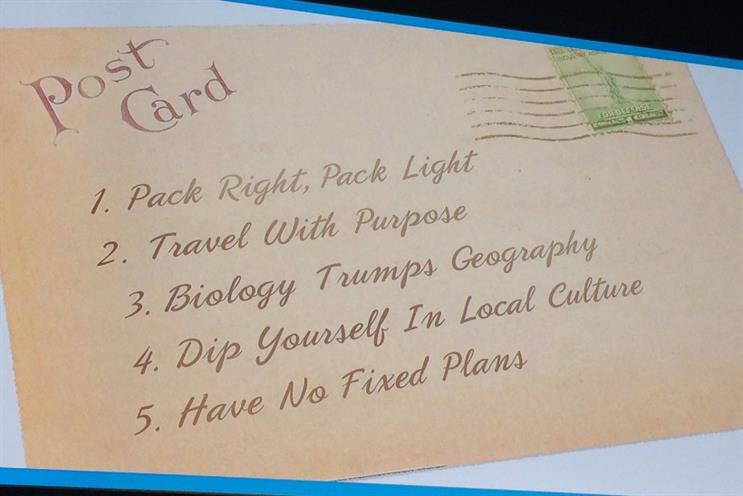
1. Pack right, pack light.
With the world’s population heading to 8bn by 2030, global brands need to be ready – not just to take advantage from a numbers game, but to understand the nuances of human behaviour versus geographical divides.
The idea of ‘packing light’ is about identifying the essence of your brand, creating a shorthand that can travel around the globe.
I believe that, like Apple, the Airbnb icon will stand for something
"The world is borderless, your work is borderless and our consumers are borderless. You need consistent iconography, look tone and feel," says Visa’s Balazs.
"I believe that, like Apple, the Airbnb icon will stand for something," explains Diageo’s Saller. "From its signature art direction, look at it and know who’s from, you know the aesthetic."
Throwing every message at your brand that covers the wants and need of your countries is a terrible idea, advises Balazs.
She recommends starting with the fundamental question: what can you not live without? Pair it back and find the insight: when starving, you can become liberated.
"At Visa, two years ago we needed to think about our multi stakeholder audience. Our solution was ‘Visa everywhere you want to be’. Just that - that’s what’s in our suitcase. Snickers’ ‘You’re not you when you’re hungry’ is a wonderful line that works in 85 countries."
2. Travel with purpose
Today’s best, most successful brands are going beyond transactional messaging to tap into something deeper.
Consumers are looking for clarity, transparency and authenticity that withstands public scrutiny
Saller believes brands must look at their higher order role, with the notion of brand purpose crossing borders in a way functional benefits never could.
"Purpose can be an audacious statement. It might not even ever be achievable, but you’re relentless in your pursuit of it. Consumers are looking for clarity, transparency and authenticity that withstands public scrutiny," she says.
As an example of purpose, Uncle Ben’s estate agent stunt was heralded by Balazs as a "beautifully executed" example of purpose, free of any lofty or worthy ambitions. The campaign shows people viewing a new house with no kitchen, before they are hit by the punchline that kids will not know how to cook in the future, so kitchens are redundant.
Saller demonstrated how Diageo is embracing purpose through the global work around Guinness.
"In Europe we have Sapoeurs and in the US we have wheelchair basketball. When it came to Africa we knew purpose was relevant but these two would not work.
"’Made of more’ is about a new generation of progressive Africans. They are totally different from their parents, pushing the edges of culture and making their mark in their own unique way. It is genuinely inspiring and delivering growth in our markets."
Humans are global and biology trumps geography hands down
3. Biology trumps geography
Of course, ideas and campaign executions can travel, with the Olympics a perfect example of how brand platforms can be executed globally while still tapping into emotions.
But there is core truth that global brands must always remember. "Humans are global and biology trumps geography hands down," says Balazs.
"Humans have brains, and brains have neurochemicals. We emit those chemicals when we hear, see and taste great advertising. That works, that sells products."
Whether through storytelling or easy to grasp themes, such as the WREN first kiss film that now has 100m views, humans have more in common than their geographical location.
4. Dip yourself in local culture
On holidays now, people want to live like a local not a tourist
"On holidays now, people want to live like a local not a tourist," says Balazs. Similarly, marketing should no longer be imprinted on a region by HQ.
Referring to this as "bottom-up campaigns", BBDO’s Schalit believes that your eyes must be open to the work happening in your brands and agencies around the world. "Global brand thinking is not necessarily coming from brand HQ."
5. Have no fixed plans
Saller agrees that not all great work comes from the centre. "They say a traveller has no fixed plans; you don’t go to the fixed places."
Dove Sketches came out of from Brazil and Unilever HQ saw the work and ran with it, she adds. "If you were trying to the work top down with Sketches, then the London team would want it set in London, the US would want different talent, another country would want it run in Q1 and another in Q3. But it was made in Brazil, they saw it got traction and they were ready to put investment behind it. You have to be ready to move with pace when you seeing something really working."
Saller’s advice is to encourage experimentation within the whole global organisation. "Put it online, throw some activation money behind it, then respond. Pour the gas and watch it go."
Recommended


